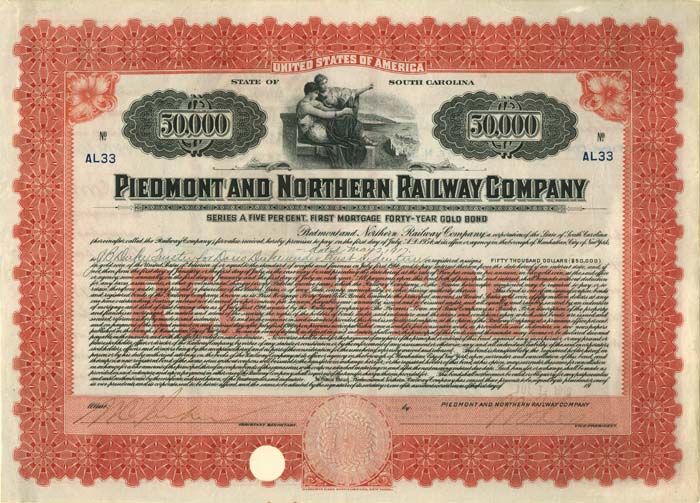Piedmont and Northern Railway Co. $50,000 Gold Bond signed by James B. Duke
Inv# AG1571 Bond
$50,000 5% Gold Bond signed by James Buchanan Duke (December 23, 1856 – October 10, 1925) was a U.S. tobacco and electric power industrialist best known for his involvement with Duke University. James Buchanan Duke, known by the nickname "Buck", was born near Durham, North Carolina to Washington Duke and his second wife, Artelia Roney Duke. Duke was married twice, the first in 1904 to Lillian Fletcher McCredy, but they divorced in 1906 and had no children. In 1907 he married the widow Nanaline Holt Inman, with whom he had his only child, a daughter, Doris. Doris was raised at Duke Farms located in Hillsborough, New Jersey, where her father had worked with landscapers to transform more than 2,000 acres of farmland and woodlots into an extraordinary landscape containing 2 conservatories, 9 lakes, 35 fountains, 45 buildings, countless pieces of sculpture, over 2 miles of stone walls and more than 18 miles of roadway. Washington Duke had owned a tobacco company which his sons James Buchanan Duke and Benjamin Newton Duke took over in the 1880s. In 1885, James Buchanan Duke acquired a license to use the first automated cigarette making machine and by 1890, Duke supplied 40% of the American cigarette market. In that year, Duke consolidated control of his four major competitors under one corporate entity, the American Tobacco Company, which was a monopoly in the American cigarette market. At the start of the 1900s, Duke tried to conquer the British market as he had done America, eventually forcing the then divided British manufacturers to merge into the Imperial Tobacco Company of Great Britain and Ireland, Ltd. After two years of intense competition in Great Britain, Imperial Tobacco took the fight to the US market, forcing American Tobacco to look for a settlement. This resulted in an agreement whereby American Tobacco controlled the American trade, Imperial Tobacco controlled the trade in the British territories, and a third, cooperative venture named the British-American Tobacco Company was set up between the two to control the sale of tobacco in the rest of the world. In 1906, the American Tobacco Company was found guilty of antitrust violations, and was ordered to be split into three separate companies: American Tobacco Company, Liggett and Myers, and the P. Lorillard Company. In 1892, the Dukes had opened their first textile firm in Durham, North Carolina that was run by Benjamin Duke. At the turn of the century, Buck Duke organized the American Development Company to acquire land and water rights on the Catawba River. In 1904, he established the Catawba Power Company and the following year he and his brother founded the Southern Power Company which became known as Duke Power. The company supplied electrical power to the Duke's textile factory and within two decades, their power facilities had been greatly expanded and they were supplying electricity to more than 300 cotton mills and other industrial companies. Duke Power established an electrical grid that supplied cities and towns in the Piedmont Region of North and South Carolina. Lake James, a power-generating reservoir in Western North Carolina, was created by the company in 1928 and named in Duke's honor. In December 1924, Duke established The Duke Endowment, a $40 million trust fund some of which was to go to Trinity College. The University was renamed "Duke University" in honor of his father. The "James B. Duke Library," the main campus library at Furman University, is also named for his philanthropic relationship with the university. On his death, he left approximately half of his huge estate to The Duke Endowment which gave another $67 million to the trust fund. In the Indenture of Trust, Duke specified that he wanted the Endowment to support Duke University, Davidson College, Furman University, Johnson C. Smith University; not-for-profit hospitals and children's homes in the two Carolinas; and rural United Methodist churches in North Carolina, retired pastors, and their surviving families. The remainder of Duke's estate, estimated at approximately $100 million, went to his twelve-year-old daughter, Doris, making her "the richest girl in the world". Doris sued her mother for control of the Duke Farms estate and won. Associating Duke Farms with fond memories of her father, Doris Duke made few major changes to the property other than the adaptation of her father’s Conservatory to create Display Gardens in his honor.
Rare!
A bond is a document of title for a loan. Bonds are issued, not only by businesses, but also by national, state or city governments, or other public bodies, or sometimes by individuals. Bonds are a loan to the company or other body. They are normally repayable within a stated period of time. Bonds earn interest at a fixed rate, which must usually be paid by the undertaking regardless of its financial results. A bondholder is a creditor of the undertaking.









Ebay ID: labarre_galleries